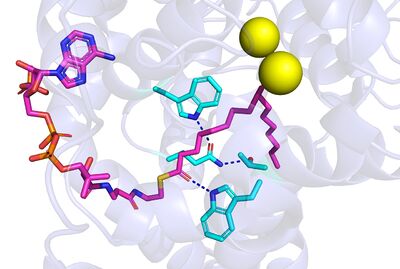We apologize for Proteopedia being slow to respond. For the past two years, a new implementation of Proteopedia has been being built. Soon, it will replace this 18-year old system. All existing content will be moved to the new system at a date that will be announced here.
User:Abbey Wells/Sandbox 1
From Proteopedia
(Difference between revisions)
| Line 20: | Line 20: | ||
== Active Site == | == Active Site == | ||
Two structures of SCD known. One structure shows the substrate, water molecule, and zinc (4YMK). The second structure shows the product and iron (6WF2). For the pictures below, the structure is shown with two zinc ions in order to demonstrate how is <scene name='87/877627/Zn_and_water/1'>water</scene> coordination with the ions. Water is used in the mechanism, which is why we chose to use the structure with zinc to explain the active site. | Two structures of SCD known. One structure shows the substrate, water molecule, and zinc (4YMK). The second structure shows the product and iron (6WF2). For the pictures below, the structure is shown with two zinc ions in order to demonstrate how is <scene name='87/877627/Zn_and_water/1'>water</scene> coordination with the ions. Water is used in the mechanism, which is why we chose to use the structure with zinc to explain the active site. | ||
| - | The two <scene name='87/877627/Just_zn/1'>zinc</scene>ions are 6.4 Angstroms apart. The ions sit above the kink in the active site. They are stabilized by the <scene name='87/877627/His_box2/1'>his box</scene>. The ion closest to C9 is 5.2 angstroms from it. This ion interacts with 4 histidines, H156, H265, H294, H298, and one water molecule. The ion closest to C10 is 4.7 angstroms away from it. This ion interacts with 5 histidines, H116, H121, H153, H157, and H297. These 9 total Histidine residues form a <scene name='87/877627/His_box2/1'>his box</scene>.The his box is used to stabilize the ions into the active site, forming a prosthetic group. The his box is highly conserved among the other isoforms of SCD. Other residues around the his box are used to hydrogen bond to the histidines to stabilize them. These residues include: <scene name='87/877627/E161/1'>E161</scene> | + | The two <scene name='87/877627/Just_zn/1'>zinc</scene>ions are 6.4 Angstroms apart. The ions sit above the kink in the active site. They are stabilized by the <scene name='87/877627/His_box2/1'>his box</scene>. The ion closest to C9 is 5.2 angstroms from it. This ion interacts with 4 histidines, H156, H265, H294, H298, and one water molecule. The ion closest to C10 is 4.7 angstroms away from it. This ion interacts with 5 histidines, H116, H121, H153, H157, and H297. These 9 total Histidine residues form a <scene name='87/877627/His_box2/1'>his box</scene>.The his box is used to stabilize the ions into the active site, forming a prosthetic group. The his box is highly conserved among the other isoforms of SCD. Other residues around the his box are used to hydrogen bond to the histidines to stabilize them. These residues include: <scene name='87/877627/E161/1'>E161,</scene> |
| - | <scene name='87/877627/N261/1'>N261</scene> | + | <scene name='87/877627/N261/1'>N261,</scene> <scene name='87/877627/D165/1'>D165,</scene> <scene name='87/877627/E291/1'>and E291</scene> |
Revision as of 19:02, 6 April 2021
Stearoyl-CoA Desaturase 1 from Mus musculus
| |||||||||||
References
- ↑ Ransey E, Paredes E, Dey SK, Das SR, Heroux A, Macbeth MR. Crystal structure of the Entamoeba histolytica RNA lariat debranching enzyme EhDbr1 reveals a catalytic Zn(2+) /Mn(2+) heterobinucleation. FEBS Lett. 2017 Jul;591(13):2003-2010. doi: 10.1002/1873-3468.12677. Epub 2017, Jun 14. PMID:28504306 doi:http://dx.doi.org/10.1002/1873-3468.12677
Student Contributors
- Abbey Wells
- Josey McKinley
- Anthony Durand

